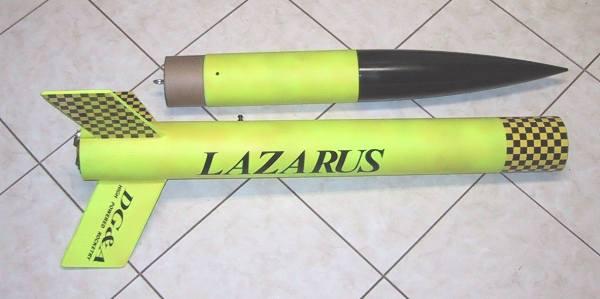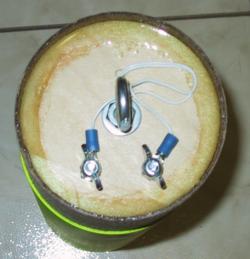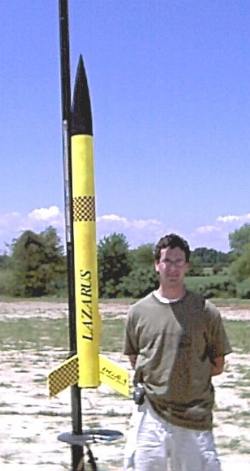DG&A High Power Rocketry Lazarus
DG&A High Power Rocketry - Lazarus {Kit}
Contributed by Dick Stafford
| Manufacturer: | DG&A High Power Rocketry |

(Contributed - by Dick Stafford - 07/20/01)
 Brief:
Brief:
The DG&A Lazarus is a straight-forward high power rocket kit with a 38mm
motor mount. It would make a good Level-1 cert rocket and has a small payload
bay suitable for your electronics.
Construction:
The Lazarus came in its own shipping box. The components inside were packaged
carefully, there was no shipping damage, and all the parts were accounted for.
The airframe (4" x 34") and payload section (4" x 11") are
made of sturdy, brown, glassine covered paper tubing. The finish is nice and
spirals are shallow, which should make finishing easier. You have to cut your
own fin slots, but the fin and launch lug lines were pre-marked and
color-coded. The nose cone is 16 ½" long and is very sturdy.
"R.W.W. DIST." appears on the shoulder. The payload coupler tube is
made of cardboard and is thinner-walled than the airframe tubing. The 38mm
motor tube is 11" long and is made of thick walled cardboard. The three
through-the-wall fins, two centering rings and payload bulkhead are all made of
1/4" plywood. These have a thick inner layer with a thin outer ply on each
side. There was splintering on the edges of two of the fins. The recovery
system includes two eyebolts, one quick link, a 45" section of strap nylon
with metal eyelets, about 12 ft. of 1" elastic, and a 36" parachute
made from light rip-stop nylon. The provided 1/2" launch lug consists of
4" of thick walled cardboard tubing. Two 6/32 T-nuts are provided for
motor retention, but there are no bolts or clips provided. Finally, the kit
comes with vinyl decals with the rocket's name, in simple black lettering.
This kit comes with very detailed instructions, which include illustrations and B&W photos. The overall quality of the instructions was excellent, however, I have a few concerns. 1) They suggest you may fiberglass the airframe after the kit is assembled (generally, it is easier to do so before installing fins, the launch lug, etc.). 2) They recommend you smooth the epoxy fillets with your rubbing alcohol covered finger (with no warnings about possible reactions to the contact with epoxy). 3) There is no reference to internal fillets for the fins. In my opinion, these are omissions and may throw a curve to an inexperienced builder. I believe that instructions should be directed at less experienced builders, as the experienced ones will figure it out on their own anyway.
Construction was straight-forward and proceeded per the instructions, with a few exceptions. I used 15-minute epoxy throughout, and did no fiberglassing. I started by beveling the fin edges. This was a slow process with my orbital sander, so I installed a sanding attachment on my RotoZip. I had nice sharp edges in no time, and the imperfections on the edges of the fins were all but wiped out. I strengthened the edges with thin CA.

The centering rings fit nicely and required no sanding. However, the coupler tube used for the payload section did not fit in the airframe tubing. I contacted the manufacturer who merely said to sand the coupler. Although some sanding may have done the trick, I wasn't up for doing so. Instead, I found that the inner tube from a 4" mailing tube I had in my stockpile worked perfectly. So, I opted to chop off a 6" section and use that. I had to do some minor sanding on the bulkhead as my tube was just a tad thicker than the one provided.
 I made the following
enhancements during construction. First, I did not glue the rear centering ring
in until I had installed the fins and had applied internal fillets. Next, I
added a heavy swivel for parachute attachment. I also added electrical
connections to the payload bulkhead to facilitate using my G-Wiz Deluxe for
ejection duties. Finally, I added a pair of Matt's Rail Buttons in addition to
the 1/2" lug that was provided.
I made the following
enhancements during construction. First, I did not glue the rear centering ring
in until I had installed the fins and had applied internal fillets. Next, I
added a heavy swivel for parachute attachment. I also added electrical
connections to the payload bulkhead to facilitate using my G-Wiz Deluxe for
ejection duties. Finally, I added a pair of Matt's Rail Buttons in addition to
the 1/2" lug that was provided.
Finishing:
I didn't try to make the epoxy fillets pretty, so I built them up with SuperFil
from Shadow Composites. After some light sanding, I laid on several coats of
Krylon white primer. One side of the fins filled easily, but the other was
coarser and required a couple of extra coats. The spirals filled nicely, but
after priming, I noticed that the tube also had a subtle ridge in between the
grooves. I did not try to sand this down. I painted the rocket fluorescent
yellow and added yellow and black checkerboard trim. After a problem with paint
compatibility (details omitted!), I painted the nose cone solid black. The
final touch was the vinyl lettering that came with the kit. This stuff was
great. The letters were individually placed on an adhesive background. So, you
lay down the decal strip, and then removed the backing, leaving just the
lettering. You have to be gentle as the letters initially try to come off with
the backing, but this wasn't a problem. The result is perfectly spaced
lettering, without the clear surrounding background.
Construction Rating: 3 out of 5
 Flight:
Flight:
I flew my Lazarus with one of the newly certified I285 Redlines, off of a
BlackSky rail. Although the Lazarus payload was set up for altimeter ejection,
I decided to stick with motor ejection. Sims with a similar motor said the
optimal delay was 11 seconds, so I chose a medium, 10 second delay. It was a
nice straight flight. The Lazarus really scooted above the bright red flame!
The motor was retained with aluminum clips that I move from rocket to rocket. I
used a heat shield from Giant Leap in place of wadding. There was some singeing
on the chute - my problem, not the rocket's.
Recovery:
One end of the nylon strap connects to an eyebolt on the forward centering ring
with a quick-connect (provided). The strap elastic is tied to the other end of
the nylon strap and to a second eyebolt on the payload bulkhead. I added a
hefty swivel for parachute attachment, a few feet down from the nose cone. I
felt the chute that was provided may be a little small considering the weight
of the rocket and the backswept fin design, but the ground at the launch site
was relatively soft (mowed grass). The recovery was just fine. One fin has a
bit of dirt on it, but no damage.
Flight Rating: 4 out of 5
Summary:
This simple, solid kit would be fine for an introduction to high-power. The
components are good quality and are sturdy. The detailed instructions are very
easy to follow. I also liked the decals/lettering. However, I was a
disappointed with the fit of the tube coupler and feel that the issues with the
instructions may make this kit more appropriate for someone with good mid-power
experience and/or who has done some research on construction techniques.
Overall Rating: 3 out of 5
Related External Links
 |
 |